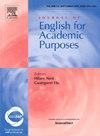“Figure 2 shows that …”: Evidentiality in Chinese graduate students’ research articles
IF 3.4
1区 文学
Q1 EDUCATION & EDUCATIONAL RESEARCH
引用次数: 0
Abstract
Evidentiality is an important interpersonal resource in academic discourse, indicating sources of information and authorial commitment to propositions. Compared to other interpersonal resources in academic writing, however, evidentiality is an understudied area. In particular, much is unknown about the possible similarities/differences between student writers and expert writers in their use of evidentiality in research articles (RAs). The present study, adopting a systemic functional linguistics perspective, reports a corpus-based comparative examination of evidentiality in Chinese graduate students' coursework RAs and expert writers' published RAs. The study's aim is to discern the extent to which Chinese graduate students differ from expert writers in their use of evidentiality in English RAs in four disciplines: mathematics, physics, metallurgy, and materials science. The results showed that Chinese graduate students, as English as a foreign language (EFL) writers, use significantly more evidentials in their RAs than expert writers and their repertoire of evidentials is relatively limited. Chinese graduate students also show strong preferences for certain types and realizations of evidentiality and thus display less variety and flexibility in their use of evidentials in their RAs. This study provides evidence for the relationship between writers' writing skills and language proficiency and their use of evidentiality in RAs, and may contribute to our understanding of evidentiality in academic discourse.
“图2显示……”:中国研究生研究文章的证据性
证据是学术话语中重要的人际资源,表明了信息来源和作者对命题的承诺。然而,与学术写作中的其他人际资源相比,证据性是一个未被充分研究的领域。特别是,学生作家和专家作家在研究文章(RAs)中使用证据性方面可能存在的相似/差异尚不清楚。本研究采用系统功能语言学的观点,基于语料库对中国研究生的课程论文和专家作家发表的论文的证据性进行了比较研究。这项研究的目的是辨别中国研究生在数学、物理、冶金和材料科学四个学科的英语RAs中使用证据性的程度与专家作家的不同。研究结果表明,中国研究生在英语写作中使用的证据明显多于专业作者,且证据的使用范围相对有限。中国研究生对证据的某些类型和实现也表现出强烈的偏好,因此在他们的研究中使用证据的多样性和灵活性较低。本研究为作者的写作技巧和语言熟练程度与证据性使用之间的关系提供了证据,并有助于我们理解学术话语中的证据性。
本文章由计算机程序翻译,如有差异,请以英文原文为准。
求助全文
约1分钟内获得全文
求助全文
来源期刊

Journal of English for Academic Purposes
Multiple-
CiteScore
6.60
自引率
13.30%
发文量
81
审稿时长
57 days
期刊介绍:
The Journal of English for Academic Purposes provides a forum for the dissemination of information and views which enables practitioners of and researchers in EAP to keep current with developments in their field and to contribute to its continued updating. JEAP publishes articles, book reviews, conference reports, and academic exchanges in the linguistic, sociolinguistic and psycholinguistic description of English as it occurs in the contexts of academic study and scholarly exchange itself.
 求助内容:
求助内容: 应助结果提醒方式:
应助结果提醒方式:


